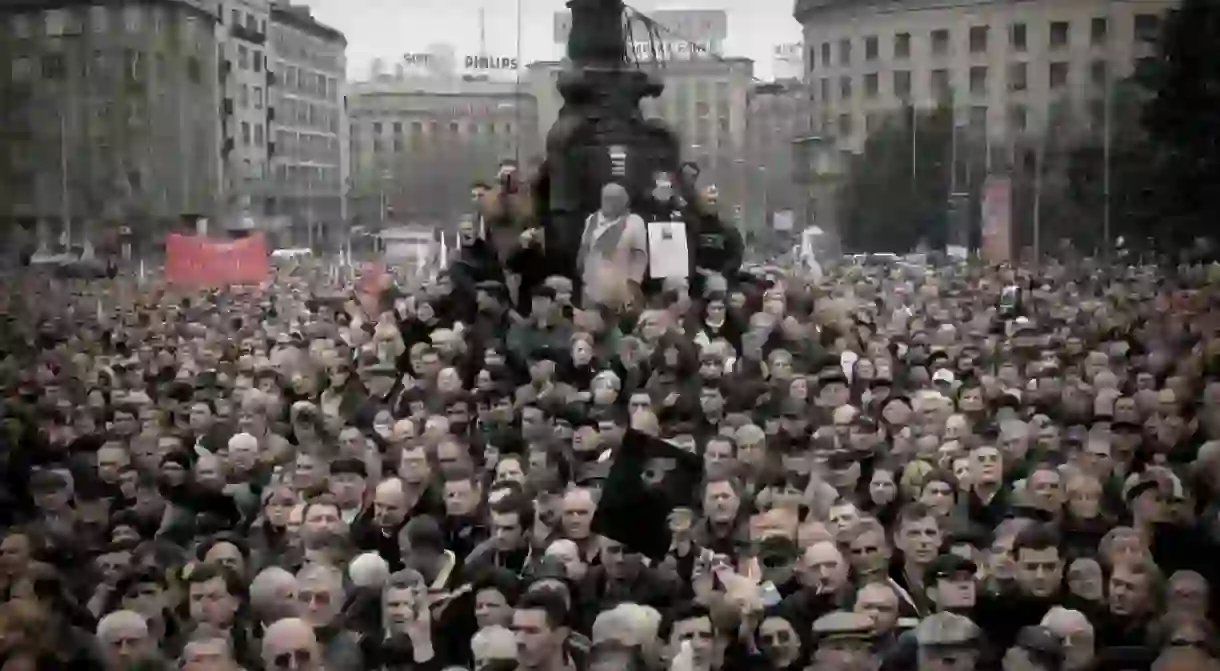Vidovdan: The Eventful History of Serbia's National Day

There are plenty of days of national importance for Serbia throughout the year, but none come close to the intensity and emotion of June 28. Known as Vidovdan, the day is the very heart of what makes Serbia ‘Serbia’. Why is that? There are almost too many reasons to note.
Vidovdan
June 28 itself is actually a general Christian feast day, venerating Saint Vitus. Vitus is the patron saint of many nations (including Serbia, obviously), along with some typically entertaining things such as snake bites, oversleeping and comedians.
It is more than just a feast day in Serbia however, as the Serbian Church remembers its holy martyrs and the birth of the Serbian national identity. This alone is enough to make it hugely important, but a number of interesting anniversaries are ‘celebrated’ on June 28 in Serbia.

The Battle of Kosovo
And it all begins with Kosovo. On June 28, 1389 (June 15 if we’re using the Julian calendar, which we aren’t), the armies of Serbia and the Ottoman Empire collided at Kosovo Polje, setting in motion a sequence of events that would end with five centuries of Ottoman occupation of Serbia. Prince Lazar was offered subjugation or death, and he plumped for the latter. His people were left with the former.
It didn’t exactly play out like that, of course. The battle itself was more of a draw, and almost a century passed before Serbia fell entirely. But this is where the beginning of the Serbian national consciousness can be traced to, and it is the inspiration for countless epic poems and stories over the years. It is the centrepiece of thought on June 28 in Serbia, although ironically not really so important to the majority of Kosovo’s population.

World War I becomes inevitable
525 years after Lazar and Sultan Murad were slain on the Field of Kosovo, another war became inevitable thanks to a perfect storm of imperial arrogance and national anger. Archduke Franz Ferdinand, the heir to the Habsburg throne in 1914, decided that June 28 was the right day to make a pomp and circumstance visit to Sarajevo, a city in recently subjugated Bosnia and Herzegovina that was home to a large population of Serbs.
The decision was suicidal at best, but the inexperienced assassins in the city almost allowed Franz to get out unscathed. Six youngsters missed their shot (or abandoned the plot altogether), but Gavrilo Princip wasn’t about to do the same. The young Bosnian Serb shot the Archduke and his wife, leading Austria to declare war on Serbia and bring about World War I.

The Tito-Stalin split
A lot of people assume that Yugoslavia was a part of the Soviet sphere of influence, but the truth couldn’t be further from that. Tito and Yugoslavia were the first to break from Stalin and the Soviet Union, and the events that led to the official split were put in motion on Vidovdan, 1948.
On that day, the Cominform published a harsh condemnation of the Yugoslav communist leaders, expecting Tito and his allies to roll over in favour of risking a split from the Soviet Union. Josip Broz was no ordinary leader however, and the split was brought forward. Yugoslavia was to forge its own path on the Cold War stage.

The rise and fall of Slobodan Milošević
June 28, 1989 acted as an unofficial coronation for Slobodan Milošević, 12 years before he finally found himself deported in order to stand trial. In the former, the man known as Slobo gave a speech to a huge crowd in Gazimestan, on the spot of the Battle of Kosovo as Yugoslavia threatened to collapse in a flood of ethnic violence. The speech was far more conciliatory than many books and journalists have since reported, but it was clear that Milošević had positioned himself as the new leader of the Serbian people.
On June 28, 2001, any pretence of him holding onto that position went when he was deported to the Netherlands. His trial at The Hague was soon to begin, but it dragged on for almost five years before Milošević died in jail.

Serbia’s first female and LGBT Prime Minister
In 2017, Ana Brnabić became the first woman to hold office as Prime Minister of Serbia, along with being the first openly gay individual to do so. In a vehemently conservative society these are no small achievements, but there has been plenty of criticism when it comes to the timing of Brnabić’s promotion. Progress is certainly being made in Serbia, but many believe it is progress in order to give the impression of progress.
What will June 28 hold for the people of Serbia over the next few centuries? If the previous seven are anything to go by, a whole lot of tumultuousness awaits these proud and passionate people.














